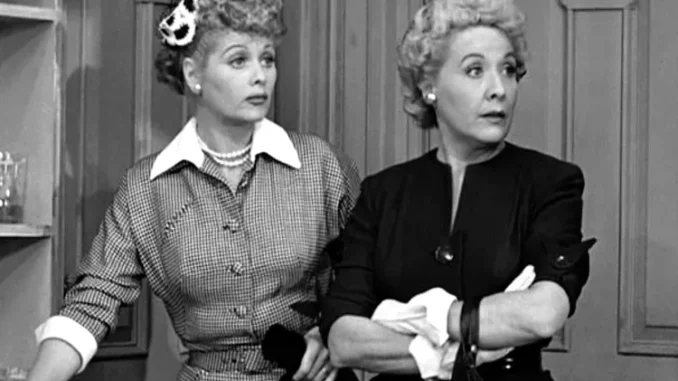
Few love stories in Hollywood are as iconic, complicated, and enduring as that of Lucille Ball and Desi Arnaz — two people whose laughter, passion, and creative brilliance helped redefine television forever. In her moving documentary Lucy and Desi, actress and filmmaker Amy Poehler takes viewers inside their extraordinary partnership, capturing both the comedy legends’ dazzling rise and the heartbreaking realities that came with it.
A Deeply Personal Look Behind the Legends
Premiering on Amazon Prime Video, Lucy and Desi offers a rare and intimate portrait of the couple behind one of television’s greatest hits, I Love Lucy. Using never-before-seen home movies, rare audio recordings, and exclusive interviews, Poehler brings audiences closer to the real people beneath the myth.
“They weren’t just America’s favorite couple on TV — they were pioneers who built something that changed the industry forever,” Poehler said. “But behind all the laughter was a story of love, sacrifice, and heartbreak.”
Poehler’s direction focuses not only on their revolutionary achievements but also on the fragile balance between love and ambition — the tension that ultimately made their story both inspiring and tragic.
The Romance That Changed Television
Lucille Ball and Desi Arnaz met in 1940 on the set of Too Many Girls and fell in love almost instantly. Their chemistry was electric — both on-screen and off. Despite cultural differences, busy careers, and public skepticism, they married later that year and soon became Hollywood’s golden couple.
Their shared dream culminated in I Love Lucy (1951–1957), the groundbreaking sitcom that transformed American television. Not only did they co-star as Lucy and Ricky Ricardo, but they also co-founded Desilu Productions, the studio responsible for innovations still used in TV today — like filming in front of a live audience with multiple cameras.
“They changed the entire format of television production,” Poehler explained. “Without Lucy and Desi, we wouldn’t have modern sitcoms as we know them.”
Their on-screen love story mirrored their real one — full of humor, warmth, and chaos. But off-screen, the pressures of fame, constant work, and Desi’s personal struggles began to take a toll.
The Pain Behind the Laughter
Poehler’s documentary doesn’t shy away from the couple’s darker chapters. Through candid interviews with family, friends, and industry peers, Lucy and Desi explores how the pair’s marriage slowly unraveled under the weight of success and personal conflict.
Desi’s infidelity and struggles with alcohol, coupled with Lucille’s relentless perfectionism and drive, created an emotional distance neither could fully bridge. Despite their deep affection for one another, the couple divorced in 1960 — the same year they sold Desilu Productions, the empire they had built together.
“They couldn’t make it work as husband and wife,” Poehler reflects, “but they never stopped loving each other. That’s what makes their story so human.”
The documentary highlights a bittersweet truth: though their marriage ended, their mutual respect and creative bond never did. Even after their divorce, Ball and Arnaz remained close friends and continued to speak fondly of each other until Arnaz’s death in 1986.

The Legacy They Left Behind
Lucy and Desi celebrates the duo’s enormous cultural impact — not only as entertainers but also as trailblazers who broke barriers in Hollywood.
Lucille Ball became the first woman to run a major television studio, paving the way for future generations of female producers and comedians. Desi Arnaz, a Cuban-American immigrant, revolutionized how television shows were filmed, distributed, and marketed — shaping the business side of entertainment for decades.
“Desi was the businessman, Lucy was the visionary,” Poehler said. “Together, they built something that changed the world.”
The documentary reminds audiences that I Love Lucy wasn’t just a show — it was a cultural phenomenon that celebrated diversity, love, and laughter in a postwar America that desperately needed joy.
Amy Poehler’s Perspective: A Love Letter and a Lesson
As a comedian and producer herself, Amy Poehler brings a unique empathy to the project. Known for Parks and Recreation and Saturday Night Live, Poehler has spent her career balancing humor and emotion — much like Ball did.
“Lucille Ball wasn’t just funny — she was fearless,” Poehler said. “She took risks every day in an industry that wasn’t built for her. I wanted to honor that.”
Her approach to storytelling is tender but unflinching. She uses their relationship as both a love story and a cautionary tale about ambition, fame, and the price of innovation.
Through letters, phone recordings, and archival footage, audiences hear Lucille and Desi in their own voices — laughing, fighting, reminiscing — revealing a level of vulnerability rarely seen in Hollywood icons.
A Celebration of Imperfect Love
At its heart, Lucy and Desi is more than a documentary — it’s a celebration of two people who changed each other and the world through love, art, and courage. Poehler doesn’t romanticize their flaws, but she treats them with compassion and understanding.
The final scenes — featuring audio of Arnaz telling Lucille, “I love you, I love Lucy,” before his death — remind viewers that some love stories never truly end.
“They couldn’t stay together, but they never stopped being each other’s home,” Poehler says in the closing narration. “That’s what makes their story timeless.”
Final Thoughts
Lucy and Desi is a heartfelt, beautifully crafted exploration of Hollywood’s most legendary couple — a story about passion, resilience, and the complicated nature of love. Amy Poehler’s direction breathes new life into their legacy, offering fans both nostalgia and new insight.
Through laughter, heartbreak, and everything in between, Lucille Ball and Desi Arnaz remain proof that true love doesn’t always mean forever — sometimes, it just means forever remembered.